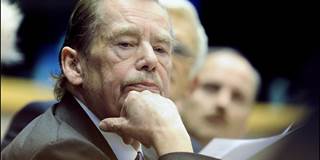In the debate about Europe's ongoing refugee crisis, it is as if the clash between closed-minded chauvinism and open-hearted humanism had drowned out common sense. To think more clearly about the subject, all Europeans would do well to recall Václav Havel’s take on it.
PRAGUE – Fifteen years ago, the Czech statesman and playwright Václav Havel noted that some Czech politicians “recognize two different kinds of violence, genocide, terror, and mafias: one that is better, and one that is worse. The better kind is pan-Slavic, and the worse kind is Islamic.” The response to the current influx of mostly non-European refugees and migrants suggests that this worldview – shaped by fear of the unknown – remains pervasive in Central Europe today.

PRAGUE – Fifteen years ago, the Czech statesman and playwright Václav Havel noted that some Czech politicians “recognize two different kinds of violence, genocide, terror, and mafias: one that is better, and one that is worse. The better kind is pan-Slavic, and the worse kind is Islamic.” The response to the current influx of mostly non-European refugees and migrants suggests that this worldview – shaped by fear of the unknown – remains pervasive in Central Europe today.